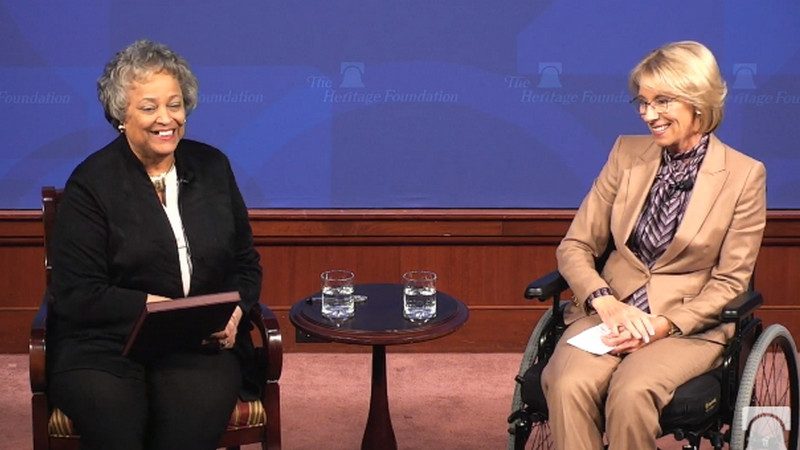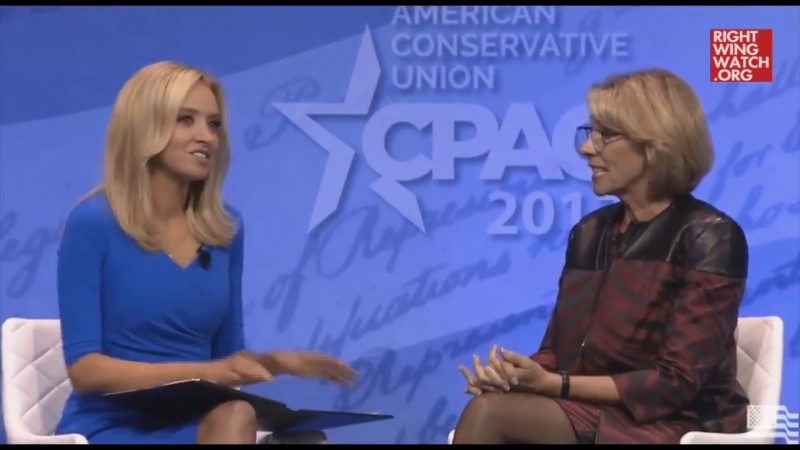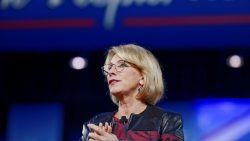U.S. Secretary of Education Betsy DeVos celebrated National School Choice Week on Wednesday with an appearance at the right-wing Heritage Foundation for an event promoting “school choice” generally, and marking the 15th anniversary of the federally run voucher program in the District of Columbia. “School choice” is an umbrella term encompassing an array of different programs, all of them funded by taxpayers, and many of them financed at the expense of regular public schools. DeVos, who was in a wheelchair because she is recovering from a December 30 bike accident, was interviewed by Heritage Foundation President Kay Coles James, who called DeVos “an American treasure and a national hero.”
DeVos’ remarks were brief, but she was quick to find a target. Claiming that two-thirds of Americans support “school choice,” DeVos said that “the only thing standing in the way is teachers’ unions.” Heritage couldn’t agree more: Among the school-choice-related posts highlighted on the Heritage Foundation’s website this week was one saying that the teachers’ strike in Los Angeles “underscores” the need for “education choice.” (Conservatives, not surprisingly, have been less than thrilled at the energized and energizing wave of activism by teachers’ unions.)
DeVos is an old hand at this. She has, in the words of Mother Jones’s Krisina Rizga, been “trying to gut the public schools for years.” Indeed, DeVos and her allies have spent many years and many millions of dollars engaged in bare-knuckled politics to elect politicians who will advance an anti-public-education, anti-labor, pro-privatization agenda, and her family has played a key role in building right-wing anti-public-education infrastructure.
Before her appointment by Trump to lead the Department of Education, DeVos was best known as a major donor to Religious Right organizations and causes, born into one wealthy right-wing family, and married into another. A few years ago, Inside Philanthropy said that the legislative successes of the “school choice” movement were due in large part to the DeVos family’s “remarkable talent for moving money by the truckload into socially conservative causes to shift voters’ and lawmakers’ mindsets in a rightward direction.” Carol Burris of the Network for Public Education calls NSCW “a carefully crafted public relations campaign to remind lawmakers of the financial muscle of its sponsors.”
As we have noted in previous years, National School Choice Week is essentially a giant nationwide public relations spectacle—complete with an official dance and tens of thousands of cheerful bright yellow fleece scarves—that portrays itself as nonpolitical. “NSCW is a nonpartisan, nonpolitical, independent public awareness effort,” says the group’s website. “Therefore we are not associated with any legislative lobbying or advocacy.”
It’s hard to take that claim seriously. NSCW President Andrew Capanella used to work with DeVos at the American Federation for Children, one of the many lobbying groups she funded. While NSCW has gotten increasingly secretive about its funders and partners, it was created by and has been supported by right-wing foundations, for-profit-corporations seeking to siphon money from public schools, pro-privatization activists, and think tanks hostile to the very idea of public education. At Heritage, DeVos called on Congress to reauthorize the D.C. voucher program with an “automatic growth piece” so that the program could continue to expand.
The explicit strategy of NSCW is to use the broad “school choice” messaging to cover over the huge differences between different kinds of “school choice,” which can include everything from public school districts creating magnet schools for art or science to legislation diverting tax dollars to religious schools, for-profit management companies and homeschoolers. It’s designed to give cover for parts of that agenda, such as taxpayer vouchers for private schools, that have had a hard time winning public support at the ballot box.
In D.C., National School Choice Week kicked off, as usual, with a press conference featuring members of Congress, but it was “more subdued” than in recent years, reported The 74, a publication sympathetic to NSCW, as “federal school choice efforts face increased headwinds from the new Democratic House majority.” Indeed, education writer Jeff Bryant has noted that in 2018, progressive candidates reflected “increasing skepticism about doling out cash to private education entrepreneurs.”
The legislative successes of the “school choice” movement have brought with them a series of charter school-related scandals highlighting the harm to students and taxpayers caused by the lack of oversight and accountability besetting many such programs. Last fall, the Center for American Progress published a report documenting “deceptive and harmful business practices” as well as a frequently dismal record of academic achievement by for-profit “virtual” schools that exist under the umbrella of “school choice.” The mixed results from charter schools and voucher programs—some work well and some fail—are a counterpoint to the premise that market forces and competition are a magic bullet for the struggles facing some public schools. There’s also evidence that the spread of “school choice” programs is leading to greater segregation, discrimination, and the political disempowerment of communities of color.
When President Trump announced that DeVos was his pick to be education secretary, the New York Times noted that her impact on policy had been felt most directly in her home state of Michigan, but not in a good way. “[I]f Michigan is a center of school choice, it is also among the worst places to argue that choice has made schools better,” wrote the Times’ Kate Zernike. One scholar who had examined the record of voucher programs called DeVos’s nomination to the Secretary of Education “a triumph of ideology over evidence that should worry anyone who wants to improve results for children.”
At Heritage, DeVos’s remarks were followed by a panel discussion focused on the D.C. voucher program. One of the panelists was Virginia Walden Ford, a supporter of the D.C. voucher program whose son thrived in a private school. As a parent activist, she got early funding from DeVos for her DC Parents for School Choice group. Ford is the inspiration for “Miss Virginia,” a forthcoming movie featuring “Orange is the New Black” star Uzo Aduba and actor Matthew Modine. “Miss Virginia” is being produced by the Moving Picture Institute, a nonprofit that creates movies that promote libertarian ideology. Supported by the Koch brothers networks, the Mercer Family Foundation and other right-wing foundations, it also produced “The Cartel,” a 2009 documentary attacking public education, as well as movies targeting environmentalists, denying climate change, and promoting fracking.









